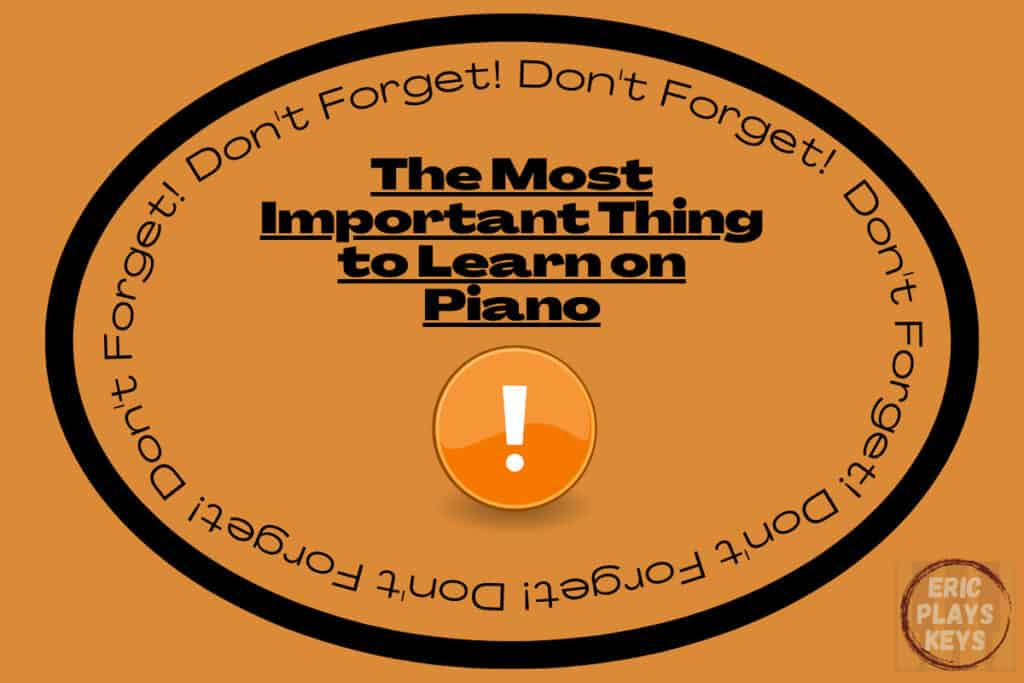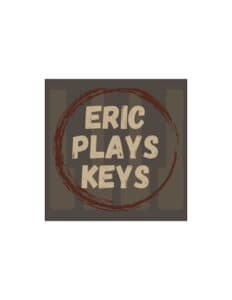
Learning to play piano and progressing can be difficult, especially when you don’t know what to focus on. There’s lots of advice from teachers, online resources, and other musicians that may either contradict, or not sound fun at all. I hope I can clear up the confusion, and provide my insights as to what your MAIN focus should be.
Playing music that you enjoy is the most important thing you can learn to do on the piano. This is the only way you will feel connected to the instrument, and commit to practicing regularly. Scales, exercises, and assignments will improve your playing, but are not essential.
In this article, I’ll expand on why it’s so important to build your repertoire of your favorite material, how to build your repertoire, and some other considerations for improving your piano skills.
Learn Material That You Love, and You’ll Never Stop Playing
If you want to stick with playing piano long term, you have to enjoy the process. Mastering music you enjoy listening to is the only way to reward yourself for your hard work. Sitting down at the piano and playing songs you love is truly a great feeling.
I’m not saying exercises, scales, music theory, assignments from teachers, and whatever else is bad. All I’m saying is that these are not the things that keep you going. Playing piano is supposed to be fun, so don’t exclude the fun parts by only focusing on the busy work.
Whatever your favorite music is, focus the majority of your attention on making progress in that area. It doesn’t matter if the style of music you like isn’t normally played on piano. Even genres like rap and EDM, which rarely have piano parts, are comprised of chords and melodies that you can learn on piano.
If you’re really into classical music or jazz music, you’re in luck. These genres have a very strong emphasis on piano playing, and you’ll find tons of resources to learn pieces and songs. Spend time listening to the great players in your genre, and learn the songs you like!
There’s absolutely no need to continue learning songs or material that you don’t like, because your teacher said so, or because you think you should. If you don’t connect with the music, you’ll eventually forget what you’re learning anyways. In addition, you may start to resent practicing, which is a recipe for quitting the instrument.
Don’t be afraid to pivot when necessary! Personally, I played classical music for 13 years before giving it up completely. I enjoyed that music while I learned it, and I got a lot out my lessons. However, I lost interest eventually, and now I focus my attention on jazz and popular music. There may come a time when I start learning classical music again – I don’t know. I listen to my heart and my gut above all else to determine what music I should play, and I recommend you do the same. This is the only way to love your craft.
The Best Way to Learn Your Favorite Songs on Piano
Listening to recordings and copying what you hear is the best way to learn new material on piano. This is because you get your information directly from the source, and you develop your listening skills. The major exception to this rule is classical music, which is always written out.
When you’re building your repertoire with songs you like, this is the method I recommend using. It’s difficult to learn music this way because you have to carefully listen many times to figure out what notes and chords are being played. However, once you’ve finished learning the song, there’s no way you’re forgetting it. After this repetition and focused listening, the song will be engrained in your head forever.
This is what’s known as ear training. Being able to identify what note is being played in a song, and finding the corresponding note on the piano is a skill that can be developed. Repetition is really the only way to get good at this (unless you have perfect pitch, which is very rare).
You can start by figuring out the melody notes, as they are usually the highest pitched note in the song and easiest to hear. After that, try to figure out the bass notes, which are the lowest pitched notes. Hopefully, the notes making up chords, which will be played in between the melody and bass notes, will be easier to identify last. A little bit of music theory training will go a long way in knowing what notes will likely be played together, which notes clash.
I do want to emphasize that there are other ways of learning new material that aren’t bad. You can always watch tutorials online, get lessons, or read sheet music if you want. These can be great ways of learning, and I’ve definitely utilized these resources plenty of times. My only words of caution here would be that you won’t really internalize the music you’re learning by using only these tools. For example, if you learn a song using sheet music, what happens if you have to play the song without it? Maybe you’ll be fine… but no way to know for sure.
Learning songs by ear is pretty much the only way I learn new music at this point. After many, many years of doing this, I can listen to a song once or twice and play the whole thing. Sometimes, I’ll have my friends over and impress them by learning their favorite songs in one take. They attribute this skill to natural talent; I attribute it to having learned literally over 1,000 songs by ear, over 10 years or so.
How to Build Your Repertoire
So how do you figure out what songs you even want to play? This can be different for everyone, but I recommend listening to a lot of music and seeing what resonates with you. Always have music playing on the radio or on Spotify when you’re driving, browse the music section of YouTube, and listen for songs playing at restaurants and other venues you’re visiting. Any time you hear a song you like, write it down, and check it out later. Listen carefully, and decide if it’s something you’d like to play.
I have several running lists of songs I’ve learned, or songs I need to learn. These lists were built over years and years of listening to all types of music, talking to other musicians, paying attention to trending music and top releases, and being immersed in music culture. Always remember, you should be a fan of music to become a good musician.
For me, this is the most important thing to learn, so I wrote a full article on how to so here.
There Are Other Important Things to Learn on Piano As Well
One important caveat to this article is that ‘playing music you love’ often requires some homework in other areas. It’s likely you’ll have to work on your music theory, scales, and other exercises at some point to advance.
If you don’t feel like doing that hard work right now, then you’d better pick easy songs to play. If you choose to play challenging material, but don’t feel like working on your technique, you’ll likely make a lot of mistakes. Or if you don’t work on your musical phrasing, emotional songs may come off as monotone when you perform them.
For a full overview of other musical techniques to start out with, check out my article on the first things you should learn on piano.
